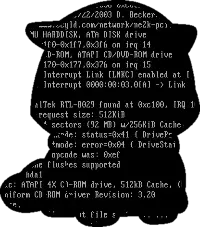This is a post by the lemmygrad user, ExotiqueMatter, to /c/genzedong
What I got out of this is that they have a really cool emoji over there, I've never seen lemmygrad emojis b4 
The hexbear crosspost has more comments:
https://lemmygrad.ml/post/5257351
This whole saga (and my own personal experience in another FOSS project this past year) has really punctuated that FOSS conceived as an exercise in collective ownership is a lie. Instead of large companies, FOSS is ruled by a collection of petty tyrants clinging to ownership of release channels. The release channel is the thing in FOSS. Arbitrating what gets distributed through a release channel is what gives people clout & power in the FOSS world, and these are - almost universally - not democratically controlled. Whenever people criticize a project, they are usually given one of two replies:
Fork it
Pull requests welcome
#1 is barely worth addressing, it's equivalent to telling someone to go frick themselves or "if you don't like it, leave". PRs are much more malicious because it's just leading people on. Getting them to waste their time doing a bunch of work that the tyrant always intended to throw away in retribution. I contribute to a project where, when I'm writing a feature, the thing at the top of my mind is "how can I build a pseudo-legal case why this should be merged" instead of "how can I make this change safely on a technical level". Because access to the project is gated by a mercurial tyrant. I only persist because the project is amazing and if I don't deal with this man (and it is almost always men) other people will continue to be driven away by him.
At this point I am verging on changing my definition of "FOSS project" to require democratic governance
How can this issue be mitigated? The current system of a (usually not so) benevolent dictator(s) is the model for all FOSS projects I know of, lemmy included. As you've touched on, this is not at all democratic. However, I don't know if there are any version control hosting platforms (gitea, forgejo, etc.) that work without the code being held in the iron fist of an authoritarian code monkey. Then there is the issue of who should be allowed to contribute; there needs to be a way of keeping out people who contribute malware, or from taking so much control that they themselves become a code tyrant without a king code monkey to spitefully swat down improvements.Even if those issues are resolved, there is still the massive gulf in power between code monkeys and non-technical users. If none of the code monkeys deign to implement features or bug fixes that non-technical users want or need, then those users are shit out of luck. Another wrench is thrown into things when it's software that runs on a server and there are also sysadmins who could pull the plug at any time even if a democratic system was built into the software.
I guess what I'm getting at is: what is a way to make FOSS as anarchic as possible without opening holes that bad actors could easily exploit and without leaving users incapable of making code be beholden to the code monkeys? The main thing FOSS has going for it is that its governance isn't as shit as how tech companies would handle it, and that's a very low bar to get over.
Watching this happen with F-Droid. A badly needed UI refresh is getting repeatedly watered down and delayed because one of the maintainers with veto power is a dinosaur who thinks people are gonna jump ship if the app looks more modernIronically, the dated UI is what makes me want to use third party clients like Droid-ify instead
FRICK YOU WHAT THE FRICK I LOVE THE FDROID UI
ITS OK
ITS FINE THE WAY IT IS
DONT FRICK WITH FDROID
WHAT THE HECK IS WRONG WITH THESE LADIES
I can't even remember what I was supposed to be recapping. Something about too many mayos in a FOSS project?
 scrolls upward
scrolls upward
Yeah, too many white people on Mastodon. That checks out because mastodon is an annoying white guy in IT kind of scene
The hexbear thread doesn't remember what we're talking about either.
feudalism is when internet? 
Finally, someone speaks of the topic at hand:
they have a user named hypercracker... lol lmao
I am now reading the essay, linked in ExotiqueMatter's post
https://h-i.works/2024/04/a-case-for-community.html
Here's the text in full, since these people usually stop paying their webhost when it comes up for renewal
To make a positive start, I want to give some props to Eugen Rochko, the original creator of Mastodon. The explosion of independent social media onto the global landscape is mainly due to the adoption of the idea he put together in 2016. It should be remembered that many people's introduction to self-hosted communities was Mastodon. In that context, Rochko deserves respect for being the door that introduced people to a new concept.
The proliferation of Mastodon could not have been predicted, with estimations of over 11,000 installed instances of the software, serving close to nine million people. For a small project started by a 23-year-old fresh out of school, that's pretty impressive.
As interest in the fediverse grows and a diverse range of people join the independent social media space, different needs and wants become apparent. Some want their spaces to be as full as possible, while others want small communities that cater to the needs of their immediate peer group. Some people want a centralized social media experience, while others are content with having their small corner of the web. The desired experiences are just as diverse as those who populate the fediverse.
In this context, a single person can't accommodate these needs and make decisions that satisfy the need for a different experience for everyone who wants that. While Rochko should be remembered as the creator of Mastodon, his leadership style has resisted the diversification of the platform experience, choosing to cling to a hard-line stance on what he feels the project should be.
The unfortunate result of this position is the project developing a reputation for being hostile to specific populations, a propensity for unilateral decision-making and replicating the toxic conditions of centralized platforms in claims to be an ethical alternative to.
This is further complicated by his cozy relationship with Facebook and Twitter, both being notorious bad actors in the social media landscape, which is at odds with his stated goal of creating a healthier social media experience that differs from centralized platforms.
The concept of Mastodon is forward-thinking, but Rockho's leadership of that idea has raised some grave concerns and questions about his intentions and motivations.
However, as Mastodon is also open source, this provides an opportunity to diverge from Rockho's singular vision to one that is more inclusive and able to dynamically adapt to the diverse needs of a growing global community that wants to escape the trap of declining centralized social media. An alternate vision can be created that invites improvements from a wide range of people who will share their experiences and expertise to help the project nimbly navigate a constantly changing digital world.
I propose Awujo, a hard-forked alternative to Mastodon that will be managed and prioritize safety, accessibility, and ease of use, managed by a consensus of diverse voices.
Awujo is the Yoruba word for community, and it was chosen to illustrate a fundamental shift from a singular and narrow vision to a broader, more inclusive perspective. A perspective that values a collaborative approach to implement a wider range of features that speak to the needs of people who want to have a curated experience with an improved version of Mastodon.
Of course, changing the direction of a project the size of Mastdon is no small task. It will require a range of contributors and the funding to pay them for their work. But we can start now.
Let's look at a high-level overview of Awujo's goals.
- Implement better safety cowtools and expand the moderation experience
- Align the front-end experience with modern accessibility standards
- Reduce technical bloat to increase performance and stability
- Simplify setup and maintenance
- Define a transparent code contribution process
- Create a stable pathway for current Mastodon instances to migrate to Awujo
It will take time to accomplish, but the framework for steady progress toward these goals can begin today.
The infrastructure for Awujo has been created, and the cowtools for collaboration, code repository, cloud instance for file sharing, and a platform for chat/audio/video conferencing are a part of the h.i. infrastructure (using all independent platforms, by the way, wink) is ready to be used.
A new codebase based on the fantastic Glitch fork of Mastodon can be created to be the foundation of the new direction. From that point, organizing people who want to be contributors and/or funders will take place to form the core governance that will create new standards that will define how the work will progress and standardize community involvement.
Once the new working group has been established, the overall goals will be broken down into digestible chunks that will be carefully integrated into the new codebase until all priorities have been covered. Of course, this entire process will be public.
In closing, I am glad Mastodon exists. It has provided a unique opportunity to build digital communities away from the corporate gaze I value. While Rockho's vision for it is problematic, that view does not have to define its direction.
We can improve it in ways that serve a healthier and richer experience.
And all it will take is for us to work together.
Contribute to Awujo here
If you're interested in being a contributor, DM me.
r.
it will be called
Awujo
it's the yoroba word for community!


























Jump in the discussion.
No email address required.
It doesn't matter that you do this for free because it's your hobby, you must implement whatever garbage feature I want because "idea people" are just as important as code monkeys
Jump in the discussion.
No email address required.
The user has a point that developers and regular users
developers and regular users  will disagree strongly how to use software
will disagree strongly how to use software  , and if developers don't at least try to pander to their non-technical user base you will just end up them fleeing and with only neurodivergents using it (i.e. Linux
, and if developers don't at least try to pander to their non-technical user base you will just end up them fleeing and with only neurodivergents using it (i.e. Linux  ). This isn't a bad thing necessarily, but if your goal is to create a competitor to Twitter
). This isn't a bad thing necessarily, but if your goal is to create a competitor to Twitter  with any semblance of popularity it probably is
with any semblance of popularity it probably is
Jump in the discussion.
No email address required.
popularity is for
Jump in the discussion.
No email address required.
More options
Context
Yeah, but the people bitching over there are what? 5% of the userbase? There's always the danger of pandering to a loud, whiny minority and wondering why less and less people use your product.
Jump in the discussion.
No email address required.
Yeah probably, but I just wanted to make this point because !codecels never seem to understand it. This is why in companies you need product managers to keep your software "engineers" in check
Jump in the discussion.
No email address required.
Normal people are going to try to use mastadon, encounter a minor hurdle, and leave because they aren't invested enough to deal with the an extra captcha or whatever. Nobody is going to make a cry post on mastadon about that sort of thing
Ex. I don't have a twitter because they didn't send a verification email and I didn't care enough to try again
Jump in the discussion.
No email address required.
Yeah rDrama is pretty good in this regard in that you can just register an account without an email, and posting doesn't require captchas. Also I love Marsey
Jump in the discussion.
No email address required.
Drama also has the devs that will implement stuff because it's fun and they're (hopefully) having a good time with it. There isn't some puritanical, do-nothing ethics committee critiquing their every move and asking how it can be more accessible.
Jump in the discussion.
No email address required.
More options
Context
More options
Context
More options
Context
This comes back to "they do it for free"
If you try to wrangle the devs like in a normal company they will just leave. The only way it makes sense for someone to code a feature pro bono is if they actually want to use it themselves.
Probably there is some way around this, like if you needed a history of OSS contributions to get a job, you could get an army of closing your PM's tickets, but the resulting software would be
closing your PM's tickets, but the resulting software would be 
Jump in the discussion.
No email address required.
Think of the DEI points they could score your project.
Jump in the discussion.
No email address required.
More options
Context
More options
Context
More options
Context
Jump in the discussion.
No email address required.
What are you talking about? Plenty of terminally-online progs spend every election trying to derail dems
Jump in the discussion.
No email address required.
More options
Context
More options
Context
More options
Context
the best non technical users to test with are not permawhiners that hang around projects, you need to show your app to your mom and that one friend who can barely work email
consider the UI testing favor as repayment for those random tech support phone calls, lol
Jump in the discussion.
No email address required.
More options
Context
True, but if you're the one doing the work, nobody else's opinions really matter unless you care to listen to them.
Jump in the discussion.
No email address required.
More options
Context
More options
Context
Imagine going up to some artist's page online and being like "Yeah you're going to draw exactly what I want for me, and if you don't then I'm being oppressed. Pay you? What, do I look like a fricking Bourgeoisie?"
Jump in the discussion.
No email address required.
More options
Context
More options
Context